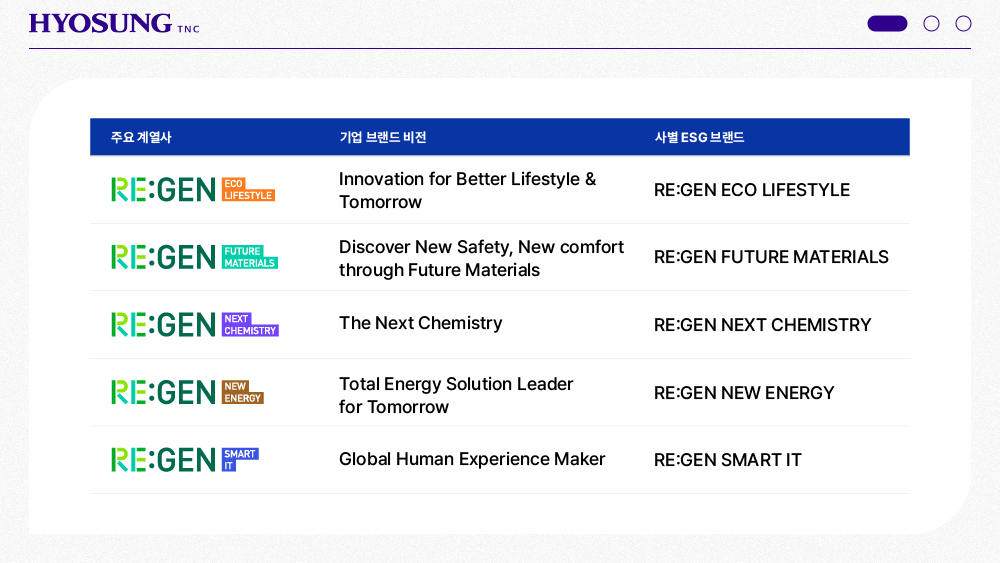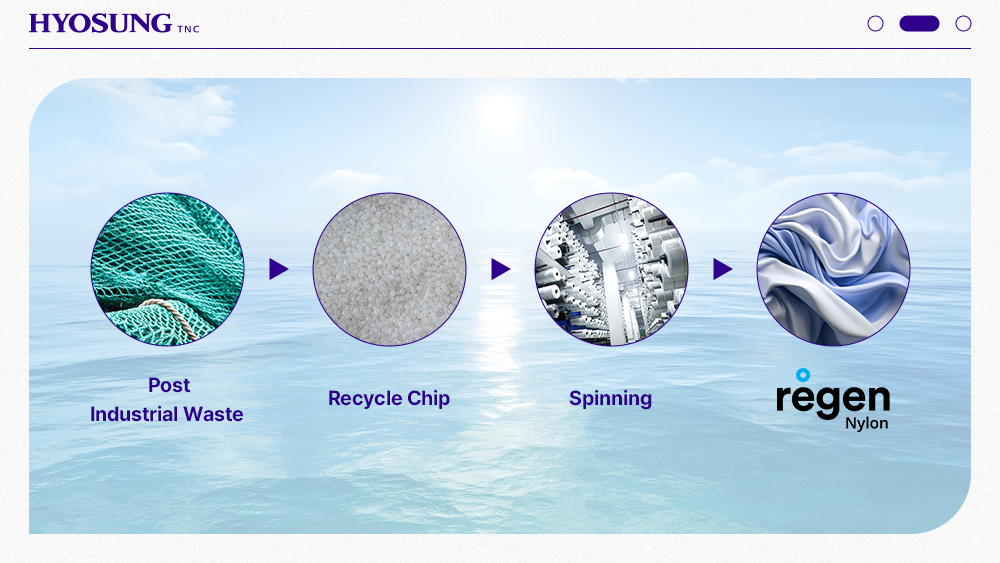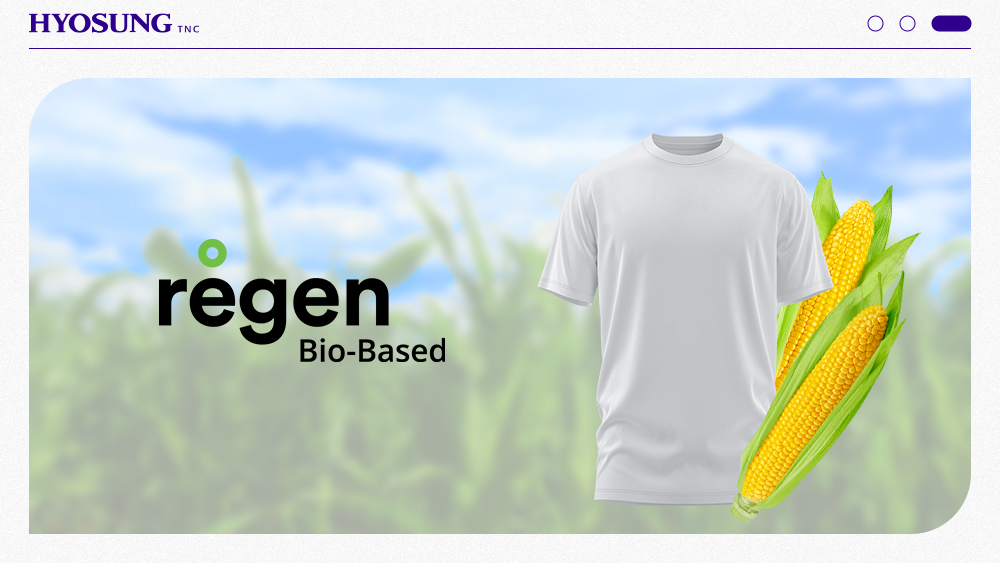<Series> Commitment for the Earth, RE:GEN ECO-LIFESTYLE
2023.07.06
Hyosung runs the ESG brand RE:GEN while realizing the core values of recycle, upcycle, zero, new energy, and save, and aiming for genuine and practical ESG management. Under the banner of RE:GEN, Hyosung endeavors to practice circular economy, carbon neutrality, new energy, and resource-saving in an effort to ensure a sustainable future based on eco-friendly and innovative technology. In line with Hyosung's aspiration to be a life innovator for the happiness and sustainable future of all generations under RE:GEN, each affiliate applies different ESG brand themes under five brands: RE:GEN ECO LIFESTYLE (Hyosung TNC), RE:GEN SMART IT (Hyosung TNS), RE:GEN FUTURE MATERIALS (Hyosung Advanced Materials), RE:GEN NEW ENERGY (Hyosung Heavy Industries), and RE:GEN NEXT CHEMISTRY (Hyosung Chemical). This series begins with RE:GEN ECO-LIFESTYLE of Hyosung TNC, the innovator of material technology for every generation. Hyosung TNC is a company that manufactures materials and textiles seen in our daily life using sustainable technologies. Its ESG theme is ECO-LIFESTYLE.

For Sustainable Oceans
While PET bottles, which require recycling, are the primary cause of land pollution, discarded fishing nets are the main contributor to marine pollution. According to Netflix's environmental documentary Seaspiracy, which was released in 2021, it is waste fishing nets that are destroying the marine ecosystem, not plastic straws. Statistics released by the Korea Maritime Institute in 2018 reveal that around 44,000 tons of fishing nets are abandoned in Korea each year. Around 640,000 tons of fishing nets are discarded in the sea each year, according to research by the National Academy of Sciences in the United States. Fishing nets that are lost in the water instead of reaching shore drift in the sea, killing marine species. It is estimated that marine life destroyed by waste fishing nets amounts to 10% of the overall catch, which cannot be overlooked. Fishing nets drifting in the sea are called ghost nets, which lead to the deaths of marine creatures. Because they are large, durable, and non-degradable, they've emerged as the primary contributor to marine pollution. To address this issue, Hyosung TNC took the initiative to recycle discarded fishing nets. By converting marine debris into fibers, Hyosung TNC develops a range of eco-friendly materials to save marine organisms, stop marine pollution, and introduce an eco-friendly lifestyle. This is how the company utilizes ghost nets that have put marine creatures and the environment at risk. Let's take a closer look.

Hyosung TNC’s Efforts to Keep the Sea Clean
Hyosung TNC spares no effort to save marine life, particularly sea turtles, and to develop a sustainable sea by converting marine debris into fiber. One of its efforts to save the oceans was the development of the world's first technology to produce fibers from ghost nets. It is regen® nylon, the world's first recycled nylon. The manufacturing process of regen® nylon goes in the order of collecting waste fishing nets, cleaning them, extracting caprolactam, and using it as a raw material to spin it into yarn for garments. When it comes to recycling, there is a misconception that the end product is of lower quality since it is not manufactured using conventional processes. regen® nylon, on the other hand, is a chemically recycled product made by returning waste to the raw material stage and then polymerizing and spinning again. It is an eco-friendly textile that not only has the same quality as premium nylon, but can also be produced into a wide range of recycled products, allowing for sustainable recycling. Because regen® nylon is lightweight and has exceptional tear strength and abrasion resistance, it is used in numerous outdoor items and garments. In addition, Hyosung TNS signed an eco-friendly material supply contract with Osprey, a well-known outdoor backpack brand that debuted a regen® nylon backpack.
What's more, regen® nylon saves 955 kg of oil per ton, saving resources by 27% compared to conventional nylon. It also emits 2.09 tons less CO2 per ton during production, resulting in a 28% reduction in GHG emissions. It is true that regen® nylon demands more labor and costs than traditional nylon, since it involves pretreatment processes such as collecting fishing nets, removing impurities, and washing. Nonetheless, in order to serve a pivotal role in achieving net zero, attaining a virtuous economy via sustainable recycling, and cleaning up the marine environment, Hyosung TNC is concentrating its efforts on the production of regen® nylon as part of its worldwide clients’ efforts to go carbon neutral.

Saving the Earth with Sweetcorn
regen® nylon contributes to keeping the waters clean by recycling fishing nets. regen® Bio-based, on the other hand, uses sweetcorn to save the earth. regen® Bio-based is the world's first bio-based spandex made from natural ingredients extracted from sweetcorn. Unlike ordinary spandex, which is derived from coal and petroleum, regen® Bio-based is made up of 70% petroleum and coal extracts and 30% bio-based material—an industrial sweetcorn extract—that was grown using eco-friendly farming practices and green fertilizers. According to the life cycle assessment (an international standard environmental impact assessment) findings, water usage was 39% lower and CO2 emissions were 23% lower compared to traditional spandex, earning the Eco-Product certification mark from SGS, a renowned eco-friendly certifying body based in Switzerland. Because regen® Bio-based employs less coal and petroleum-based raw ingredients and more renewable ingredients than conventional spandex, it is recognized as an eco-friendly material that opened a new horizon in the textile industry while reducing carbon emissions. It is projected that bio-based spandex, developed by Hyosung TNC as a novel method to deviate from the conventional approach of using petroleum and coal, will further expand its influence in the next-generation eco-friendly textile market.
For the first time in the world, Hyosung TNC created regen® nylon by recycling fishing nets, the leading cause of marine pollution, and introduced regen® Bio-based, bio-based spandex that employs sweetcorn extracts to reduce the consumption of coal and petroleum in an eco-friendly way. The company works tirelessly on developing green technology and achieving practical ESG management. As a world-class nylon yarn manufacturer, Hyosung TNC successfully developed eco-friendly yarn following relentless research and development for sustainable technology, and is expanding its product line. The company’s efforts to build a better future through closed-loop recycling, which is the core value of Hyosung's ESG brand RE:GEN, have paid off as Hyosung TNC's eco-friendly textile brand regen®, including regen® nylon and regen® Bio-based.
By taking sincere actions and making tangible efforts, Hyosung TNC strives to conserve the environment as well as uphold its social responsibilities. The company leads changes in the entire lifestyle by taking the environment into consideration and switching to sustainable ones, from fabrics and materials that are close to our daily lives. Hyosung TNC will keep working until its sustainable materials can replace the ones we use every day and create an "eco-lifestyle."
Reply to Every Generation's Future, RE:GEN ECO-LIFESTYLE